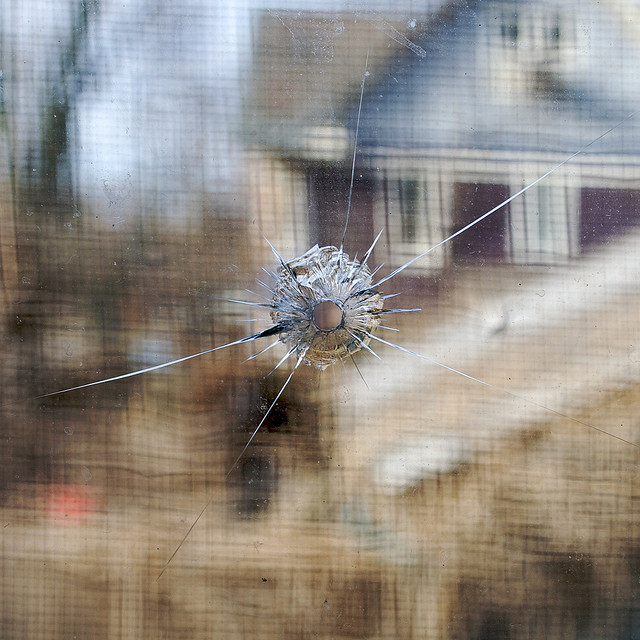Dylan Brie Ducey
The difference between this couple and some of their more fastidious contemporaries was that they were willing to view the house with the renters inside it. It was not a comfortable situation, but they went through with it. The woman who lived there was a foster mother with one teenage daughter and five foster children. The foster mother was from Port Arthur, she told the couple. Now that the house was up for sale she might go back to Port Arthur, except that she had all these kids. She didn’t know what she would do.
The youngest foster child, a little boy around five years old, hid behind the foster mother at first. He peeked fearfully at the white couple, then fled to a bedroom. Later, when the woman looked into the bedroom, the little boy was standing by the window and holding a stuffed bear tightly as if he were sure she was going to take it from him. The room was crammed with three twin beds. Dirty white carpet. The walls stark and unadorned. The woman smiled at the boy, and he gazed at her for an instant, tightening his grip on the bear.
After the couple bought the house, the woman went to the realtor’s office to pick up the keys. She had never done this before. She was thinking one, two keys at the most. The realtor was a tall man in his sixties, with a chiseled, strangely unlined face. He handed the woman a ring with twelve keys on it. “I don’t know what key goes to which lock,” he said with a shrug. “You might want to get the locks changed, um, right away. There’s no telling who has the keys to your house.”
Fifteen stairs led up to the front porch with its metal security door and a second door of solid wood. Each door had a turn lock on the doorknob as well as a deadbolt for a total of four different locks. It took the woman five minutes to try all twelve keys on each lock just so she could get inside the house that first time. The back door was the same. The locksmith was unfazed. “See it all the time,” he said. “I’ve seen twenty keys, thirty keys.”
The floor of the back porch was badly warped and needed a fresh coat of paint. At the top of the stairs, the lower part of the wooden railing was gnawed nearly in two. A Rottweiler, the realtor said, had lived there. A large blue doghouse sat in the back yard.
The back yard was engulfed with weeds grown waist-high. When the weeds were finally cut down, the couple found that the yard was littered with dozens of dime bags, syringes, and small liquor bottles buried five or six inches in the dirt.
The house had a full basement with a high ceiling, and bars on all three basement windows. One of the sets of bars was loose: someone had broken in, or broken out. Someone who lived in the house had been dealing crack. A next-door neighbor told the couple it was the foster mother’s teenage daughter. “It wasn’t those foster kids,” the neighbor said. “Wasn’t them nohow. They was good kids. The girl, though, she a world of trouble to her mother.” The neighbor said he was glad the couple had bought the house, glad for one less crack house on the block. “Y’all are quiet,” he commented. “We could use some quiet here.”
That was the house. Then there was the street. It was a wind tunnel, scattered with the detritus of the ghetto—candy wrappers, empty potato chip bags, greasy fast food bags. The wind carried them like so many feathers, and they blew continually up 39th Street from the west. An extraordinary amount of trash. This in addition to the usual scattering of dime bags, used condoms, half-eaten cheeseburgers, soda cans, cast-off furniture. There were no trees on the street. Just a few twiglike stalks, planted by the city in hopes that no one would kick them, or spray paint them, or light them on fire. These trees usually died within six months.
The street was relatively narrow. Turning your car around was tricky, even in a driveway, because the street was typically lined with parked cars. People liked to park in front of their own houses, too. It was an unwritten rule that if you didn’t have a driveway, you had a god-given right to the space directly in front of your home. As if it had your name written on it in invisible ink. There was one man who lived in the middle of the block who would stand inside his house, watching from behind the curtain. If anyone parked in front of his house, he would come outside promptly, before the driver had even gotten out, and say, “Excuse me. This is my wife’s parking space. She parks here when she gets home from work.” He was polite about this, but firm. If the driver had the gall to suggest that the man did not own the street, the man would become irate. Who did the driver think he was, taking the man’s wife’s parking space like that? Why, the wife had been parking in front of her house for twenty years and she wasn’t going to stop now! Listen, the man said. She likes it this way, so I like it this way. You go park somewhere else. Park down on West. Park up by Marcus Books on Martin Luther King. Park by Gallagher’s Liquors, though I’ll allow that wouldn’t be my first choice. There have been a few incidents lately. I’d turn your car around, go down to West. Park it real close to the curb. People tend to drive fast down West, I can’t tell you why. Guess they’re in a hurry. Still, it’s pretty wide as streets go. Your car should be okay. And my wife needs that spot. Bye now.
Twice, the couple found a dead kitten on their front lawn. Once, a sawed-off shotgun. Though it wasn’t right to call it a lawn, that meager patch of grass that Bernard tended and fertilized and mowed. The neighborhood children dropping their bicycles on the sidewalk, stopping to stare. A curiosity. There were four or five patches of grass on that block, but only one white man and one white woman. Soon, two baby girls.
The babies shared the front bedroom, the one where the foster child had stood by the window. Now the room was painted blue. The carpet had been ripped out, the wood floors sanded and polished. Against one wall stood a toddler bed with a bright canopy, a crib against the opposite wall. A changing table with neat stacks of cloth diapers, two diaper pails. A large area rug, chosen for its soft colors, its soft texture. When the babies learned to walk, they would stumble and fall not onto the hard wood floor, but onto the pink and brown flowers of the soft rug. Wooden pull toys, a stuffed otter, neatly folded pastel swaddling blankets.
Bernard felt unsafe on the street, though he never said so. Rather than walk a block to the liquor store for a gallon of milk, he would drive a mile to Safeway. The woman could have walked to the liquor store, but she did it only rarely, preferably with a baby or two in the double stroller. The babies as her shield, her cute little defenses. She did, however, walk to the café. Two blocks from the house, the Café Dejena, owned by some Ethiopians who believed staunchly that the neighborhood was coming back. “Up and coming,” they said. Which was amusing in a bleak way because that was exactly what the realtor had said. “Up and coming.” Coming up from where, exactly?
To get to the café, the woman had to walk past the fruit stand on Martin Luther King, Jr. Way, where, Bernard assured her, they were most certainly not selling fruit. “But,” the woman said, “I saw fruit there. Oranges. Apples.” And Bernard smiled, bemused.
The gunfight happened at one o’clock in the morning on a weekend. A booming of semi-automatics, a spray of bullets that brought the couple instantly up out of a deep sleep. They sprang out of bed, sleep-addled and confused. Bernard went straight to the living room. The woman rushed to the children’s room where, incredibly, the two-year-old girl was sleeping peacefully. This almost defied belief; the older girl was usually a light sleeper. The woman was so relieved that she almost started crying. How would she explain a gunfight to her two-year-old? Well, she was two-and-a-half. But still.
Then the woman rushed through the kitchen to the back of the house, to the quiet little laundry room where the baby snored gently in her bassinet. This was not such a surprise, as the baby was a heavy sleeper. But the woman was deeply relieved nevertheless. Now the woman went back through the kitchen, and already she could see the lights flashing from a dozen police cars, an ambulance. Bernard out on the porch now, descending the steps. The woman got her robe and slippers and followed him. The street was lined with parked cars, as usual, and the windows of all of them were shattered. The two sidewalks covered in broken glass. People hovering on their front porches, shaking their heads in shock. Others picking their way gingerly through the sea of glass. The woman watched one man start down his steps carrying a large push broom. Then he stopped halfway down and just stayed there. He watched the police spread out up and down the block, breaching front yards and back yards, searching, searching. Their uniforms dark blue, their guns holstered, their flashlights on, searching.
Dylan Brie Ducey’s fiction has appeared in New Delta Review, whiskeypaper, decomP, Pear Noir!, The Pinch, and Gravel. Her awards include the Matt Clark Prize for fiction. She’s on Twitter at @dylanbrieducey.




